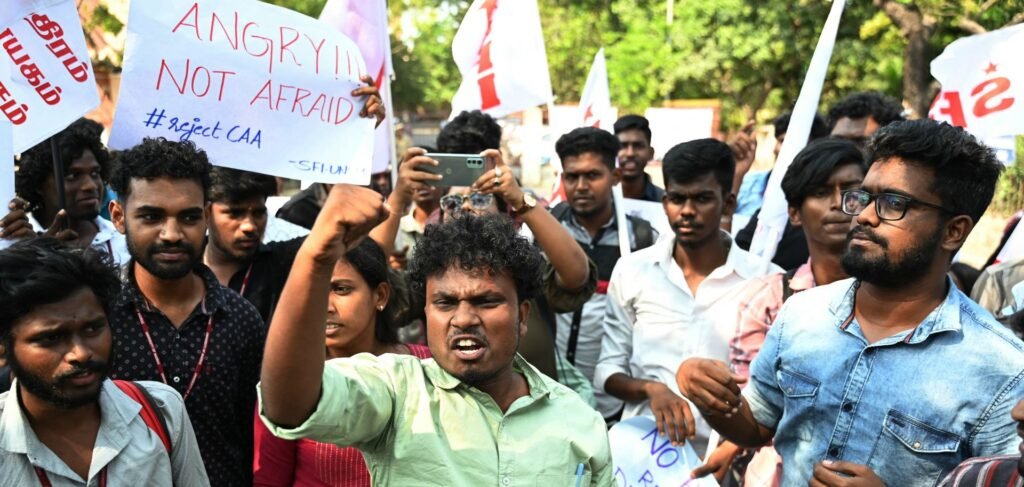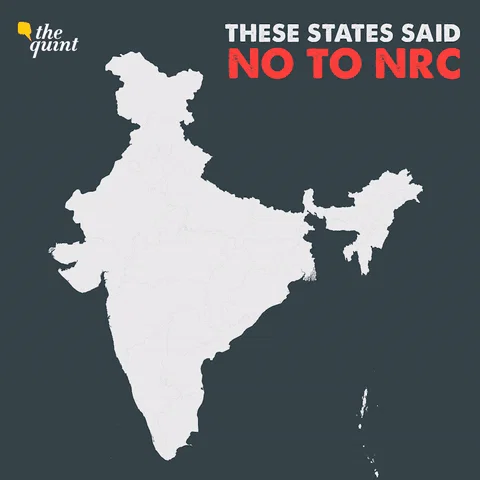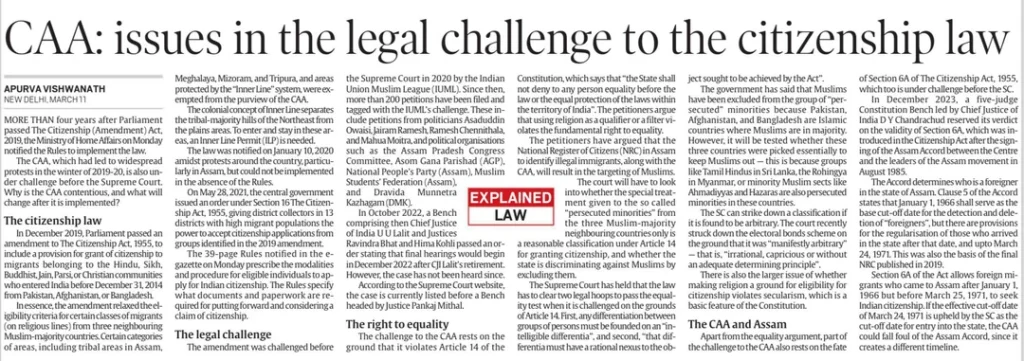In recent years, the term “CAA” has gained prominence in Indian political discourse, sparking debates and discussions across the nation. But what exactly is CAA, and why does it generate such fervent opinions? Let’s delve into the nuances of the Citizenship Amendment Act to gain a comprehensive understanding.
What Is CAA in India?, The Citizenship Amendment Act is a law that was passed in 2019 to provide a pathway to Indian citizenship for persecuted religious minorities from Pakistan, Bangladesh, and Afghanistan. It does apply to Hindus, Sikhs, Buddhists, Jains, Parsis, and Christians but not Muslims, sparking debates and protests across the country.
| Aspect | Details | |
|---|---|---|
 | What is CAA? | A legislation passed last year, under which non-Muslims who are in India till last year December 31 and are minorities in the countries of origin: Afghanistan, Bangladesh, and Pakistan, will be given citizenship. |
| Religions Covered | Hindus, Sikhs, Buddhists, Jains, Parsis, and Christians. | |
| Exemptions | The Act does not apply to Muslims migrants. | |
| Criticism | Very exclusionary and with unconstitutional features. | |
| Implementation | Does not apply to tribal areas within the regions and states which require the Inner Line Permit. |
What is CAA?
The Citizenship Amendment Act, or CAA, is a piece of legislation that was enacted in India in December 2019. It aims to provide a path to Indian citizenship for undocumented immigrants belonging to specific religious minorities from neighboring countries, namely Afghanistan, Bangladesh, and Pakistan.

Key Provisions:
The CAA offers citizenship to Hindu, Sikh, Buddhist, Jain, Parsi, and Christian immigrants who arrived in India before December 31, 2014. Notably, it excludes Muslims, leading to polarized opinions and heated discussions about the Act’s alleged discriminatory nature.
The government’s rationale behind offering citizenship to specific religions under the Citizenship Amendment Act (CAA) is rooted in the consideration of these communities as minorities facing persecution in neighboring countries. The argument is that due to their religious identity, individuals belonging to Hindu, Sikh, Buddhist, Jain, Parsi, and Christian communities in these countries often encounter discrimination and are unable to return safely. This perspective is grounded in the notion that the constitutionally Islamic nature of these countries provides protection predominantly to Muslims, leaving other minority religious groups vulnerable to persecution.
Controversies Surrounding CAA:
The CAA has been met with mixed reactions and widespread protests. Critics argue that the exclusion of Muslims violates the principles of secularism enshrined in the Indian Constitution. They express concerns about the potential misuse of the Act to target specific communities, fostering a sense of exclusion.
Proponents, on the other hand, assert that the CAA is a humanitarian effort to provide refuge to persecuted minorities facing religious discrimination in neighboring countries. They emphasize the need to distinguish between refugees seeking shelter and illegal immigrants, asserting that the Act aims to protect the former.

CAA and NRC Connection:
The CAA is often linked with the National Register of Citizens (NRC), another contentious issue. While the CAA provides a path to citizenship for specific immigrants, the NRC seeks to identify and exclude undocumented immigrants from the Indian population. The combination of these two initiatives has amplified concerns and ignited passionate debates on the broader implications for the country.
In 2014-15, India and Bangladesh exchanged 162 enclaves to address a longstanding crisis, marking an official effort to delineate and tighten the borders. Despite this resolution, the impact lingered, with expats who had permanently settled influencing the political landscape of border states. In Northeastern states like Dubri in Assam, where there is a significant Bangladeshi Muslim population, this demographic shift created upheaval, especially in areas with distinct cultural and ethnic values, contributing to complexities in local governance.
The fact which is also important to notice is that the registration of so many unregistered citizens in India who do not have Indian citizenship documents is difficult to implement.

Legal Challenges:
The CAA has faced legal challenges, with petitions filed in various courts questioning its constitutional validity. The complex legal landscape surrounding the Act adds another layer to the ongoing discussions about its ethical and constitutional implications.
The Citizenship Amendment Act in India remains a subject of intense debate, reflecting the diverse opinions and concerns within the country. As discussions persist, it is crucial to stay informed about the nuanced aspects of the CAA and its potential impact on India’s social fabric. The controversy surrounding the Act underscores the importance of fostering open dialogue, understanding diverse perspectives, and engaging in a constructive discourse on the future of citizenship in India.

Is CAA implemented in India till now?
Yes, the Citizenship (Amendment) Act, 2019 (CAA) was passed by the Parliament of India on December 11, 2019. It amended the Citizenship Act, 1955, providing an accelerated pathway to Indian citizenship for persecuted religious minorities from Afghanistan, Bangladesh, and Pakistan who arrived in India by 2014. The eligible minorities include Hindus, Sikhs, Buddhists, Jains, Parsis, or Christians. However, the law does not grant this eligibility to Muslims from these countries. Recently, Union minister Shantanu Thakur announced that the CAA would be implemented within the next seven days across India.

